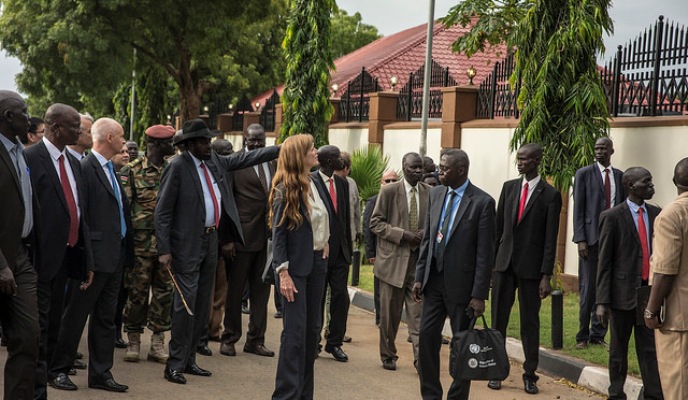President Kiir accuses UN of taking Machar’s side for regime change

September 13, 2016 (JUBA) – South Sudanese President, Salva Kiir, has expressed disappointment with the United Nations for providing a transport to his rival and former First Vice President, Riek Machar, and members of his armed opposition fighters, claiming it was part of the regime change strategy.
United Nations report released this week confirmed that the renewed fighting in Juba on 8 July was ordered by President Kiir and his army chief, Paul Malong Awan, during which they dislodged Machar with his small number of troops and followed him into the bushes until he crossed into the Democratic Republic of Congo (DRC).
UN mission in the neighbouring Congo had to extract Machar and his forces and gave him medical attention. President Kiir however said the UN should not have transported Machar. He accused Machar of returning to Juba in April not to implement the peace agreement but to rather work for a regime change from within.
“When Riek accepted to come to Juba, he was not coming for the real peace. He was coming, like comrade Taban Deng Gai said the other day, to implement what he could not achieve in the course of this senseless war. Because he had failed to achieve what he wanted through war, he decided to come to Juba so that he tries it here with the support of his friends,” President Kiir alleged.
“Unfortunately he failed again. He then had to run away and claimed he was being hunted down so that his friends could intervene. Indeed they did. They transported him to Congo and from Congo to where they are today. So it is clear that the United Nations is itself not part of the solution. So people who are now saying we are in a situation where UN is seen as not neutral have genuine concerns. And these are the issues I and members of the cabinet raised with the delegation of the Security Council when they came here,” he said.
The head of state made the remarks at his residence while speaking to some of his confidants and cabinet members on Monday. He commended his new deputy, Taban Deng Gai, for exposing what he claimed was behind the insistence of armed opposition leader for creation of the cantonment sites in the whole country.
Taban, while addressing an occasion organized by South Sudan National Youth Union in honour of the new speaker of the transitional legislative assembly, Anthony Lino Makana, said he was working with the president to establish cantonment sites in the country for integration of armed opposition forces into the Sudan People’s Liberation Army (SPLA-IO) so that there could be a unified national army.
“The cantonment sites we are going to establish are not the ones Riek Machar was advocating for. They are cantonment sites for assembling points for reintegration into the SPLA so that there is a unified army under the commander of one president. What Riek Machar was advocating for were the cantonment sites for mobilization for 2018 elections. That was why the issue took long to be resolved,” Taban alleged.
“But now with this new spirit at the presidency, we have agreed to establish cantonment sites so that the issue of arrangement is addressed and move forward with implementation of peace agreement,” Taban revealed at the occasion also broadcasted by the State owned South Sudan Broadcasting Corporation on Sunday.
But while the government accused the UN of siding with the rebellion by helping with the transport of more than 500 armed opposition fighters, the world’s body denies the allegation, saying it transported Machar and some of his members “on humanitarian grounds.”
UN also does not deny reports that it transported 62 armed opposition fighters who sustained gunshot wounds on 9 September and a further 116 on 11 September, bringing the total to 634, including Machar and his wife.
The UN said it was also acting on the request of the DRC government but the Congolese deny involvement with the airlifts. Juba has reacted with fury accusing the UN of siding with Machar.
Presidential advisor on security affairs described the transportation of the armed opposition fighters as a breach of status of forces agreement between the United Nations and the host government.
(ST)
